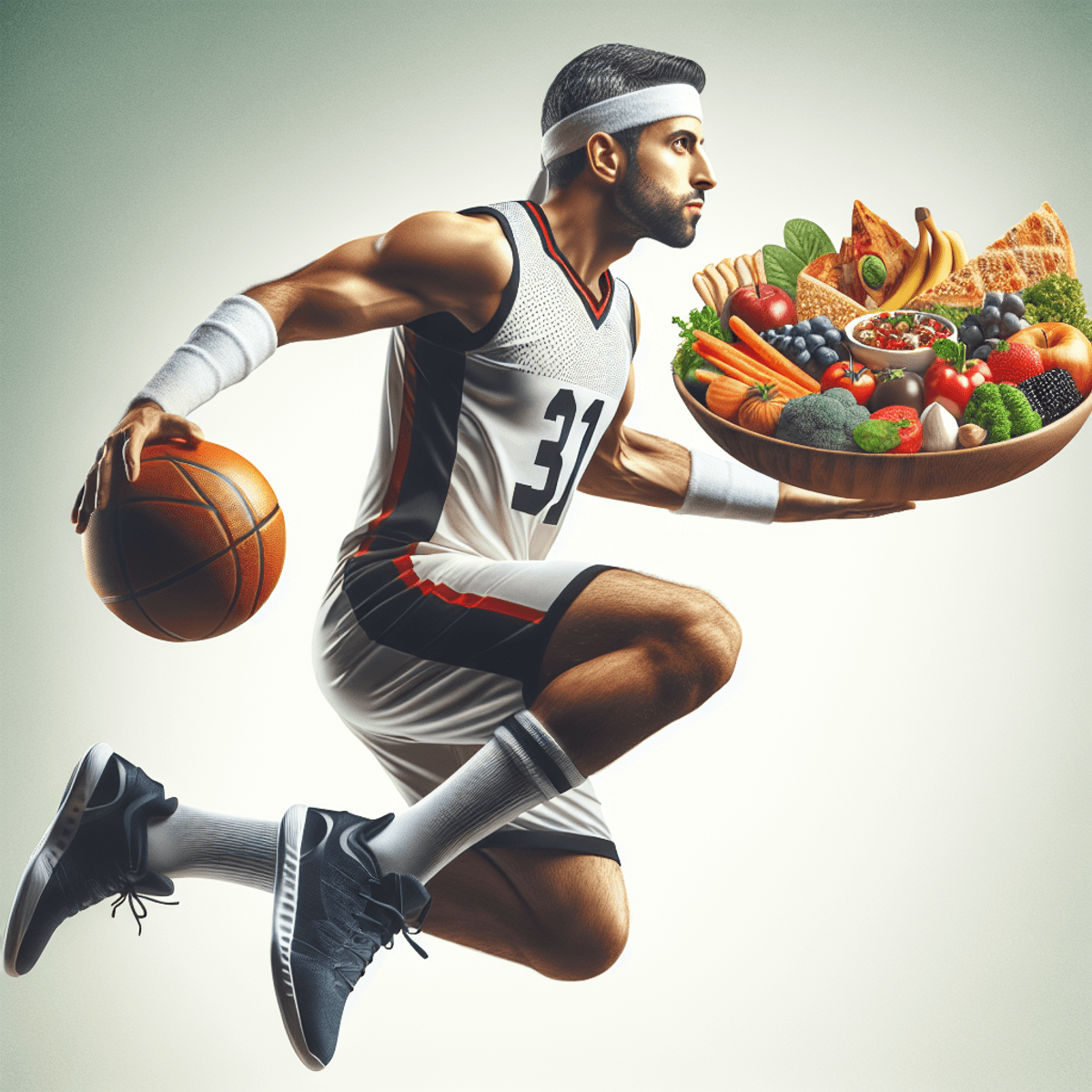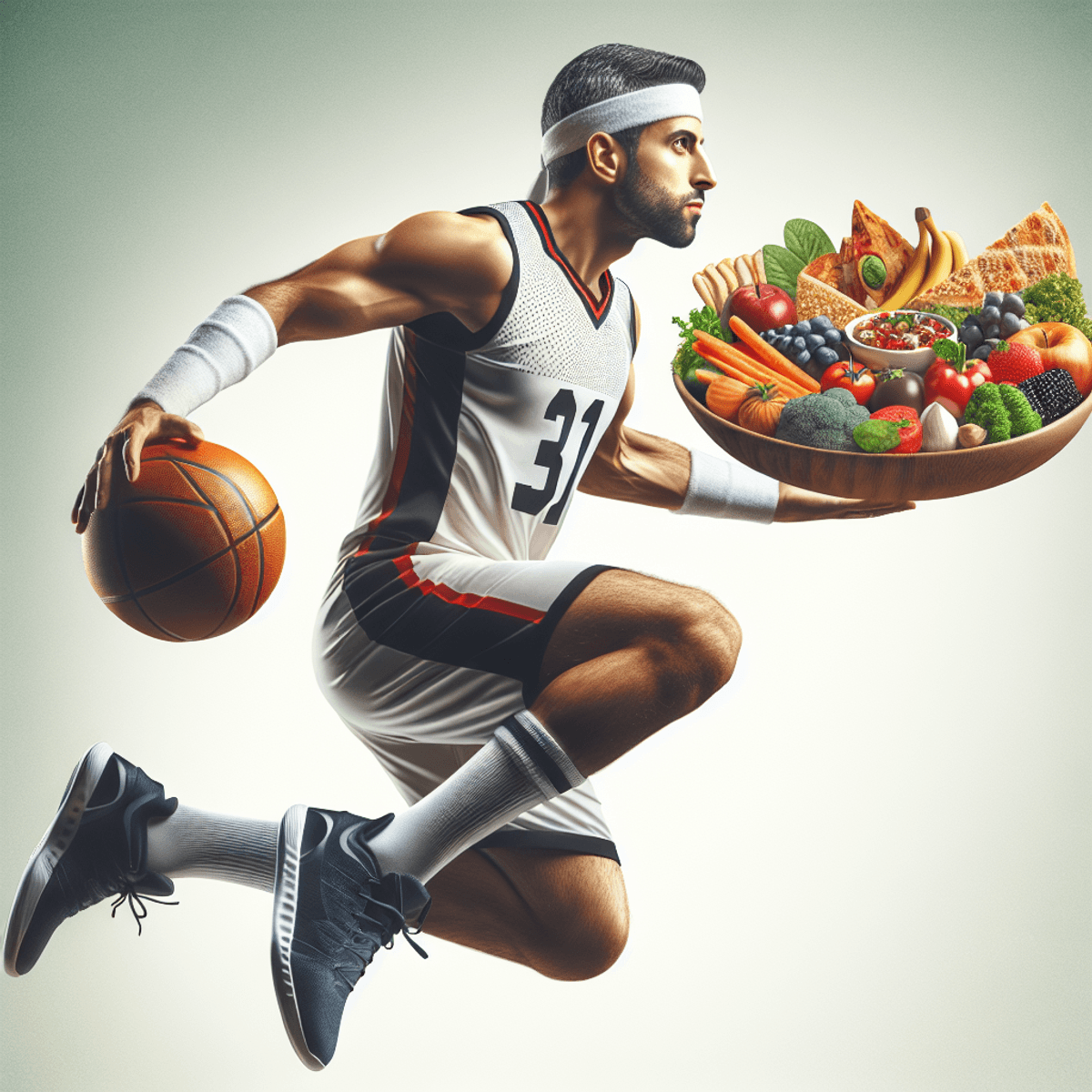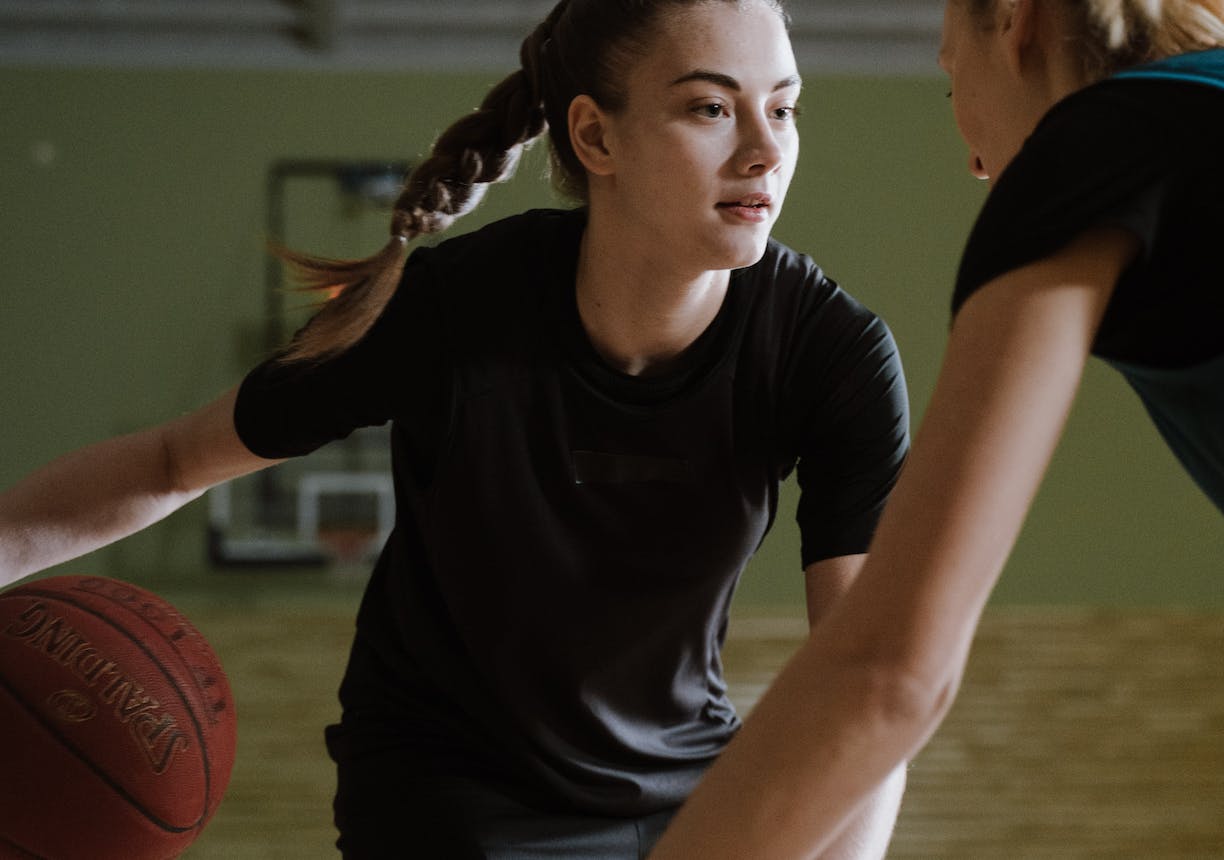
The Role of Nutrition in Enhancing Basketball Performance
Nutrition plays a crucial role in improving basketball performance. It provides the fuel your body needs, helps with muscle recovery, and optimizes energy levels for peak performance on the court.
Why Proper Nutrition is Important for Basketball Players
Basketball players have high physical demands and need a balanced diet to meet them. The right nutrients can:
- Increase endurance
- Enhance strength
- Improve focus and mental clarity
The Connection Between Nutrition and On-Court Success
There is a clear link between what an athlete eats and how well they perform in games. Eating the right foods can result in:
- Being able to play longer without getting tired
- Recovering more quickly after games or intense practices
- Having a lower chance of getting injured
To further improve your performance during basketball games, it's important to also use top-notch basketball gear that complements your nutrition plan. IE Sports offers a wide range of products including professional breakaway rims that provide durability and flexibility during intense gameplay. These rims are made from RECC Steel, ensuring long-lasting performance while reducing the risk of injuries.

Understanding the Basics of Nutrition for Basketball Players
Basketball players have unique nutritional needs due to the high-intensity nature of the sport. Proper nutrition fuels performance, enhances endurance, and aids in recovery. The foundation of an athlete's diet lies in macronutrients: carbohydrates, proteins, and fats.
Importance of Macronutrients in an Athlete's Diet
Carbohydrates are the primary energy source for basketball players. They provide the fuel needed for quick sprints, jumps, and sustained effort during games. A diet rich in complex carbohydrates like whole grains, fruits, and vegetables ensures a steady release of energy. Recommended intake varies but generally falls between 5-7 grams per kilogram of body weight per day for optimal performance.
Proteins play a crucial role in muscle growth and recovery. Basketball players need sufficient protein to repair muscle tissue damaged during intense training sessions and games. Sources such as lean meats, dairy products, beans, and legumes should be incorporated into their meals. Aim for 1.2-1.7 grams of protein per kilogram of body weight daily.
Fats are essential for overall health and should not be overlooked. Healthy fats found in avocados, nuts, seeds, and fish support cell function and hormone production. Including these in a balanced diet helps maintain energy levels throughout extended periods of play.
By prioritizing these macronutrients, basketball players can meet their dietary requirements and enhance their on-court performance significantly.
Key Vitamins, Minerals, and Hydration Strategies for Basketball Performance
Essential Vitamins and Minerals for Supporting Basketball Performance
- Vitamin D: Supports bone health and muscle function, crucial for high-impact activities like basketball.
- B Vitamins: Aid in energy production and red blood cell formation, ensuring sustained energy levels during games.
- Iron: Critical for oxygen transport in the blood, preventing fatigue.
- Calcium and Magnesium: Vital for muscle contraction and relaxation, reducing the risk of cramps.
Hydration Guidelines to Enhance On-Court Abilities
Staying hydrated is essential for peak performance. Aim to drink:
- 16-20 ounces of water 2-3 hours before a game.
- 8-10 ounces 20 minutes before playing.
- 7-10 ounces every 10-20 minutes during the game.
Proper hydration helps maintain focus, agility, and endurance on the court.
The Role of Electrolytes in Fluid Balance and Sports Performance
Electrolytes like sodium, potassium, and magnesium play a vital role in fluid balance. They help:
- Regulate nerve function
- Maintain muscle coordination
- Prevent dehydration-related issues
Effective electrolyte management is crucial for maintaining stamina during intense gameplay.
Fueling Strategies Before, During, and After Basketball Games
1. Pre-game Nutrition
Pre-game meals and snacks are critical for providing the energy needed during basketball matches. Here are some tips for pre-game nutrition:
- Opt for a balanced meal rich in carbohydrates, moderate in protein, and low in fat about 3-4 hours before the game.
- If you’re closer to game time, focus on easily digestible snacks such as a banana with peanut butter or a smoothie.
2. In-game Fuel
Maintaining performance during intense game situations requires strategic fueling. Here's what you can do to stay energized during the game:
- Consume quick-digesting carbohydrates like energy gels, fruit slices, or sports drinks to help sustain energy levels.
- Stay hydrated by sipping water or electrolyte-infused drinks at regular intervals.
3. Post-game Recovery Nutrition
Recovery fuel is essential for optimizing post-game recovery. Here are some ideas for post-game nutrition:
- Consume a mix of protein and carbohydrates within 30 minutes after the game to replenish glycogen stores and repair muscle tissue.
- Examples of post-game recovery foods include chocolate milk, a turkey sandwich, or a protein shake with fruit.
Understanding these fueling strategies not only enhances on-court performance but also aids in quicker recovery, allowing you to consistently perform at your best.
For more resources related to basketball equipment and news, explore our News section or check out products like our Replacement Nets which offer durability and versatility for all your basketball needs.
Additionally, if you're looking for IE Sports Heavy Stretch Elastic Cord, we have an excellent option available that provides superior strength and flexibility to enhance your training regimen.
The Pros and Cons of Sports Supplements for Basketball Players
Basketball players often use sports supplements to improve their performance, recover faster, and stay healthy. Here are some of the most common supplements they rely on:
- Protein Powders: Essential for repairing and growing muscles.
- Creatine: Known to increase strength and power during intense activities.
- Branched-Chain Amino Acids (BCAAs): Help reduce muscle soreness and speed up recovery.
- Caffeine: Boosts alertness and reduces fatigue during games.
- Electrolyte Drinks: Maintain hydration and electrolyte balance.
These supplements can give players a competitive edge on the court when used correctly.
Things Basketball Players Should Consider Before Using Supplements
While sports supplements can be helpful, there are important factors athletes should think about before adding them to their routine:
- Quality and Safety: Make sure to get supplements from trusted sources like IE-Sports to avoid harmful substances or banned ingredients.
- Dosage: Follow the recommended amount to prevent negative effects or potential health hazards.
- Individual Needs: Each player has different nutritional requirements, so it's best to consult a professional to customize supplement usage accordingly.
- Regulations: Understand the rules of your league when it comes to using supplements, as certain substances may be prohibited.
- Natural Sources vs. Supplements: Focus on getting nutrients from a well-balanced diet before relying solely on supplements. However, specific training tools like an IE-Sports 54" Backboard Basketball Hoop can greatly enhance practice sessions and skill development.
By taking these factors into account, basketball players can make smart choices about using supplements that align with their performance goals without risking their health or violating any rules.
💡 Fun Fact: Did you know that maintaining a healthy diet with enough protein can often eliminate the need for extra protein powders? It's all about understanding your body's unique needs and ensuring that any supplement you take actually improves your overall nutrition plan.
Additionally, using training aids like the IE-Sports Basic Rim 32in Backboard during workouts can significantly boost shooting accuracy and rebounding skills while lowering the chance of getting injured.
Building a Sustainable Nutrition Plan for Long-Term Basketball Success
A sustainable nutrition plan is crucial for basketball players aiming to maintain peak performance throughout their careers. Meal planning plays a pivotal role in ensuring that athletes receive the right nutrients at the right times, promoting muscle recovery, sustained energy levels, and overall health.
Benefits of a Structured Meal Plan for Basketball Players
A structured meal plan offers several advantages:
- Consistency: Athletes can maintain a balanced intake of macronutrients and micronutrients essential for performance.
- Energy Management: Properly timed meals help in managing energy levels, preventing fatigue during games and training sessions.
- Recovery: A well-planned diet supports faster recovery by providing the necessary proteins and carbohydrates post-exercise.
- Injury Prevention: Adequate nutrition strengthens muscles and bones, reducing the risk of injuries.
Maintaining Nutritional Consistency Despite a Hectic Training Schedule
Balancing a rigorous training schedule with consistent nutrition can be challenging. Here are some strategies:
- Meal Prep: Preparing meals in advance ensures availability of healthy options even on busy days.
- Portable Snacks: Keeping snacks like nuts, fruit, or protein bars handy can bridge nutritional gaps between meals.
- Hydration: Consistently drinking water and electrolyte-rich fluids helps maintain hydration status, crucial for optimal performance.
Integrating these practices into daily routines can help basketball players maintain nutritional consistency and support long-term success on the court.
To further enhance your game experience, consider exploring our range of high-quality basketball hoops. These hoops are designed to meet the demands of professional players while also catering to recreational enthusiasts.
Additionally, keeping your equipment organized is essential. Our IE Sports Elastic Cable Ties provide a convenient solution for managing cables, ensuring your gear stays tidy and easily accessible. These durable ties are made from high-quality materials and offer practical packaging options.
Investing in the right basketball equipment and maintaining proper organization can significantly contribute to your long-term success on the court.
Nutrition Tips for High School Basketball Athletes
Unique Nutritional Considerations for High School Basketball Players
High school athletes have different nutritional needs than adults. They are still growing and need a balanced diet with lots of vitamins and minerals to support their athletic performance and overall development.
Here are some key things to consider:
- Caloric Intake: High school basketball players often need more calories than their non-athlete peers. This is because they're using up energy for both their growth and their sports activities.
- Balanced Diet: It's important for young athletes to eat a variety of foods from all the different food groups. This ensures that they get all the nutrients they need for energy, muscle repair, and a strong immune system.
- Hydration: With intense practices and games, it's crucial for high school basketball players to stay hydrated. They should be encouraged to drink water throughout the day.
Balancing Academics, Training, and Nutrition for Optimal Performance
Finding the right balance between school, training, and nutrition can be tough. But with good time management and planning, it's definitely doable.
Here are some tips to help high school basketball players stay on top of their nutrition:
Meal Planning
Pre-planning meals and snacks can make it easier for high school athletes to eat healthy even when they're busy. Here are some ideas:
- Pack portable snacks like nuts, fruits, or yogurt that can be eaten on the go.
- Choose nutrient-dense foods that provide a good mix of carbohydrates, proteins, and fats.
- Don't skip meals – try to have something to eat every 3-4 hours.
School Lunches
School cafeterias don't always offer the healthiest options, so it's important for students to make smart choices. If possible, packing homemade lunches can give them more control over what they eat. Here are some tips:
- Include a source of lean protein (like chicken, turkey, or beans) in every meal.
- Load up on colorful fruits and vegetables for vitamins and minerals.
- Choose whole grain options for fiber and sustained energy.
Post-Practice Recovery
After a tough training session, it's important to give your muscles the nutrients they need to recover. This usually means having a snack or meal that's rich in protein. Here are some examples:
- Greek yogurt with berries
- Chocolate milk
- Turkey or chicken wrap
- Protein smoothie with fruits and vegetables
These snacks can be easily prepared and consumed after practice, helping high school basketball players replenish their energy stores and repair muscle tissue.
Considering these practical tips can significantly enhance both academic performance and athletic prowess.
Putting It All Together: A Comprehensive Approach to Basketball Nutrition
Maximizing basketball performance requires a holistic approach to nutrition. An athlete's diet should be meticulously planned to meet the unique demands of the sport.
Key Components of a Comprehensive Nutritional Plan:
- Balanced Diet: Ensuring a balance of macronutrients—carbohydrates, proteins, and fats—is essential for energy, muscle growth, and recovery. A recent study published in the National Center for Biotechnology Information (NCBI) provides valuable insights into the significance of macronutrient balance in athletic performance.
- Micronutrient Intake: Incorporate essential vitamins and minerals to support various body functions. For instance, Vitamin D and calcium are crucial for bone health, as highlighted in this informative article from Medical News Today.
- Hydration: Maintaining proper hydration levels is critical. This includes regular water intake and monitoring electrolyte balance.
Practical Tips for Implementation:
- Meal Timing: Plan meals around training sessions to optimize energy availability and recovery. The National Academy of Sports Medicine (NASM) offers useful guidance on workout and nutrition timing that can be applied to basketball training.
- Quality Over Quantity: Focus on nutrient-dense foods rather than empty calories.
- Consistency: Maintain a consistent eating schedule to regulate metabolism and performance.
Basketball players can benefit from structured meal plans that adapt to their training cycles. Tools like the IE Sports Basic Rim 44in Backboard can also enhance practice sessions by providing reliable equipment for skill development.
Incorporating these nutritional strategies can significantly enhance on-court abilities, ensuring players perform at their best during games. For solo practice, the Basketball Pass-back Rebounder offers an excellent way to keep skills sharp while also focusing on dietary consistency.
A comprehensive approach underlines the importance of nutrition in every aspect of training and game performance, making it an indispensable part of a basketball player's regimen.
Seeking Professional Guidance: The Role of Registered Dietitians in Optimizing Basketball Performance through Nutrition
Registered dietitians play a crucial role in maximizing basketball performance through tailored nutrition strategies. Their expertise extends beyond general dietary advice, focusing on the specific needs of athletes. They design personalized nutrition plans that consider:
- Energy Requirements: Basketball players have high energy expenditures. Dietitians calculate precise caloric needs to maintain energy levels throughout games and training sessions.
- Macronutrient Distribution: The ideal balance of carbohydrates, proteins, and fats varies among athletes. Personalized plans ensure optimal macronutrient intake for peak performance and recovery.
- Micronutrient Optimization: Essential vitamins and minerals are critical for overall health and athletic performance. Dietitians identify potential deficiencies and recommend appropriate supplementation if necessary.
- Hydration Strategies: Proper hydration is essential for maintaining performance. Expert guidance helps players manage fluid intake before, during, and after games.
Engaging with a registered dietitian can mitigate the risks associated with improper supplement use. Athletes often turn to supplements like protein powders or electrolytes without understanding their specific needs. Dietitians provide evidence-based recommendations to enhance efficacy and safety.
For instance, incorporating products like the 44" Backboard Basketball Hoop offered by IE-Sports can complement a player's training routine, ensuring they get comprehensive support both on and off the court.
A holistic approach, combining expert dietary advice with top-notch training tools such as Rebounder Fabric Replacement, also available from IE-Sports, optimizes overall basketball performance. These replacement parts are designed to maintain the functionality of rebounders used in training drills, contributing to an all-encompassing training regimen for players seeking excellence in their game.
Conclusion
Prioritizing nutrition is essential for enhancing basketball performance. An athlete's diet directly influences their energy levels, recovery, and overall success on the court. Consulting with a registered dietitian can provide personalized guidance to optimize your nutrition plan.
To complement your training, it's crucial to have the right equipment and accessories that support your journey. These accessories can significantly contribute to your performance and help you reach your full potential on the court.
For instance, when it comes to basketball hoops, choosing between in-ground basketball hoops and portable ones is an important decision. Our comprehensive guide covers factors like installation, ground anchors, and backyard court sizes to help you choose the perfect setup that suits your needs.
Make nutrition a core aspect of your training regimen, invest in quality equipment and accessories, and you'll be well on your way to achieving peak performance and excelling in basketball.
